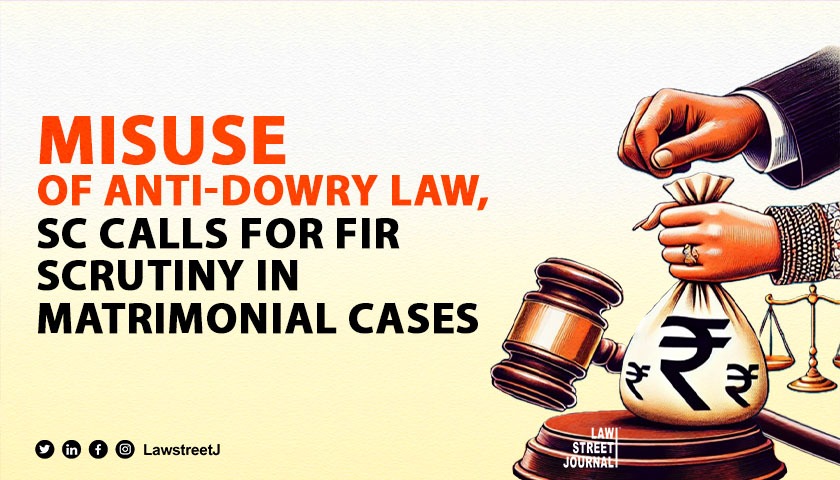NEW DELHI: The Supreme Court has said the courts must carefully examine the FIR lodged matrimonial disputes, as there is is a growing tendency to misuse of anti dowry provisions to settle personal scores and vendetta.
A bench of Justices B V Nagarathna and N Kotiswar Singh said that the Dowry Prohibition Act, was intended to curb cruelty inflicted on a woman by her husband and his family, however, in recent years, as there have been a notable rise in matrimonial disputes across the country, consequently, there has been a growing tendency to misuse the Act, as a tool for unleashing personal vendetta against the husband and his family by a wife.
Supreme Court Warns Against False Dowry Claims: Calls for Strict FIR Examination
The court emphasised that allegations during matrimonial conflicts, if not scrutinized, will lead to the misuse of legal processes and an encouragement for use of arm-twisting tactics by a wife or her family.
The court also underscored that a mere reference to the names of family members in a criminal case arising out of a matrimonial dispute, without specific allegations indicating their active involvement should be nipped in the bud.
In a judgment, the bench said there is often a tendency to implicate all the members of the husband’s family when domestic disputes arise out of a matrimonial discord.
Misuse of Anti-Dowry Law on the Rise: SC Urges Courts to Prevent Legal Harassment
“Such generalised and sweeping accusations unsupported by concrete evidence or particularised allegations cannot form the basis for criminal prosecution. Courts must exercise caution in such cases to prevent misuse of legal provisions and the legal process and avoid unnecessary harassment of innocent family members,” the bench said.
Dealing with an appeal filed by Dara Lakshmi Narayana and others, the bench noted that, in the present case, the husband’s five family members were living in different cities and had not resided in the matrimonial house of the couple, yet they were named in the FIR by the wife and dragged into the web of crime without any rhyme or reasons.
The bench said they cannot be dragged into criminal prosecution and the same would be an abuse of the process of the law in the absence of specific allegations made against each of them.
According to the facts of the case, the husband and his wife i.e. the second respondent resided at Jollarpeta, Tamil Nadu where he was working in Southern Railways. They were married in the year 2015 and soon thereafter in the years 2016 and 2017, the wife gave birth to two children. The bench said it cannot be believed that there was any harassment for dowry during this period or that there was any matrimonial discord.
The woman lodged an FIR under Section 498A of the IPC and Sections 3 and 4 of the Dowry Act, against the husband, his parents and three sisters of the husband. Section 498A of the IPC deals with offences committed by the husband or relatives of the husband subjecting cruelty towards the wife. The Telangana High Court had refused to quash the criminal proceedings against the husband and his family members.
The court pointed out the inclusion of Section 498A of the IPC by way of an amendment was intended to curb cruelty inflicted on a woman by her husband and his family, ensuring swift intervention by the state.
“However, in recent years, as there have been a notable rise in matrimonial disputes across the country, accompanied by growing discord and tension within the institution of marriage, consequently, there has been a growing tendency to misuse provisions like Section 498A of the IPC as a tool for unleashing personal vendetta against the husband and his family by a wife,” the bench said.
The court allowed the appeal and quashed the FIR and the trial proceedings against the husband and his family members.
It said that making vague and generalised allegations during matrimonial conflicts, if not scrutinized, will lead to the misuse of legal processes and an encouragement for use of arm-twisting tactics by a wife and/or her family.
“Sometimes, recourse is taken to invoke Section 498A of the IPC against the husband and his family in order to seek compliance with the unreasonable demands of a wife. Consequently, this court has, time and again, cautioned against prosecuting the husband and his family in the absence of a clear prima facie case against them,” the bench said.
The court, however, clarified that it is not stating that any woman who has suffered cruelty in terms of what has been contemplated under Section 498A of the IPC should remain silent and forbear herself from making a complaint or initiating any criminal proceeding. “But we should not encourage a case like as in the present one, where as a counterblast to the petition for dissolution of marriage sought by the first appellant-husband of the second respondent herein, a complaint under Section 498A of the IPC is lodged by the latter,” the bench said.
The bench said the allegations made by the wife in the FIR seem to be motivated by a desire for retribution rather than a legitimate grievance as notice was sent by the husband for divorce as she twice left the matrimonial home and at one time was found living with another man by the police.
“Further, the allegations attributed against the appellants herein are vague and omnibus,” the bench said.
The bench set aside the high court order, saying that it erred in not exercising the powers available to it under Section 482 CrPC and thereby failed to prevent abuse of the court’s process by continuing the criminal prosecution against the appellants.
Qua the allegations levelled by the wife, the bench said she has not provided any specific details or described any particular instance of harassment, and she has also not mentioned the time, date, place, or manner in which the alleged harassment occurred.

















